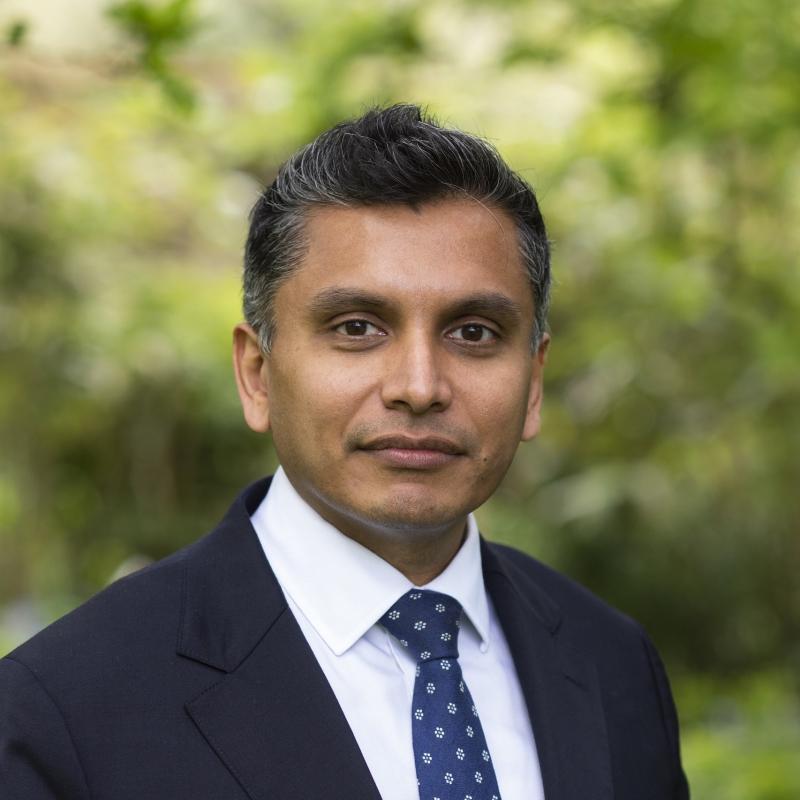Breadcrumb
Karthik Ramanna is Professor of Business and Public Policy at the University of Oxford’s Blavatnik School of Government and a fellow at St John’s College. He teaches at the Blavatnik School on managing organisations in polarised times, which led to his 2024 book The Age of Outrage.
An expert on business-government relations, sustainable capitalism, and corporate reporting and auditing, Professor Ramanna studies how organisations and leaders build trust with stakeholders. His scholarship has won numerous awards, including the Journal of Accounting and Economics Best Paper Prize, the Harvard Business Review McKinsey Award for “groundbreaking management thinking,” and three times the international Case Centre’s prizes for “outstanding case-writing,” dubbed by the Financial Times as “the business school Oscars.”
Professor Ramanna established the Case Centre on Public Leadership and the Transformational Leadership Fellowship at the School, the latter a bespoke, by-invitation programme for senior leaders looking to reimagine their public-service impact. In 2022, he co-founded the non-profit E-ledgers Institute, where he serves as principal investigator, with a mission to drive decarbonisation processes through rigorous GHG accounting. From 2016 to 2023, he was director of the Blavatnik School's Master of Public Policy programme that has educated over a thousand public leaders from about 120 countries. From July 2023 to April 2025, Professor Ramanna was on partial public-service leave from Oxford to advise the US Public Company Accounting Oversight Board, an “auditor of auditors” in global markets.
Previously, Professor Ramanna taught at the Harvard Business School in both the MBA and senior executive-education programmes. He has a doctorate from MIT’s Sloan School of Management. He lives in Oxford with his husband, Jon, and they enjoy dinner parties and touring Caravaggios.
For diary, meetings and other general enquiries email: ramanna.pa@bsg.ox.ac.uk
Featured work
On management and leadership
- “Managing in the Age of Outrage”, Harvard Business Review (2023). (A practical, how-to guide for organisational leaders in a time of deep polarisation, based on my eponymous Oxford course.)
- “Healing Fractured Societies: The Oxford Programme Building Unlikely Coalitions”, Times Higher Education (2020). (I describe how the Oxford MPPs from over 100 countries have built a collaborative community of public service.)
- “Building Better Judgment Amongst Policymakers Using the Case-Study Method”, Oxford Blavatnik School Technical Note (2020). (Beyond analytical skills and moral reasoning, universities must impart an education in good judgement: this is essential to developing competent generalists, who should be our political leaders in society. Related FT comment here.)
On sustainable capitalism
- “Friedman at 50: Is it Still the Social Responsibility of Business to Increase Profits?” California Management Review (2020). (Read why ‘Inclusive Capitalism’ can be dangerous for democracy.)
- “Thin Political Markets: The Soft Underbelly of Capitalism”, California Management Review (2015). (Read how experts use their tacit knowledge of esoteric matters to undermine market capitalism.)
- “From Confusion to Clarity”, A pragmatic, demand-driven approach to ESG reporting, based on dozens of conversations with investors and business executives, prepared for PwC (2023).
On accounting and auditing
- “Accounting for Climate Change”, Harvard Business Review (2022). (An auditable, cost-effective, and easy-to-use approach to supply-chain carbon accounting to replace the flawed “Scope 3” approach: winner of the HBR-McKinsey prize.)
- “Building a Culture of Challenge in Audit Firms”, PwC Future of Audit Initiative (2019). (Part of a series on audit and governance reform; more here)
- “The International Politics of IFRS Harmonization”, Accounting, Economics and Law — A Convivium (2013). (Read how the idealist project to create a common accounting language worldwide was hijacked by domestic and international politics.)




